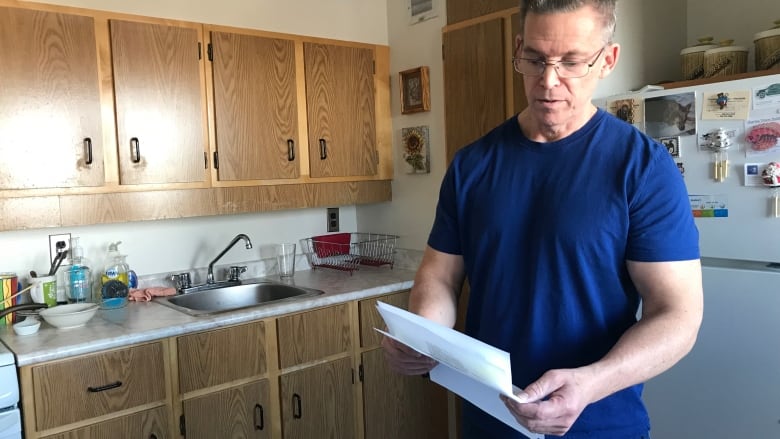Disabled Saskatoon couple worried they 'could end up on the street' due to benefit changes
'There's going to be a lot of people who might run into this'

Cameron Duff says he and his wife Anita turning 65 will not make their disabilities vanish, but will mean they won't be allowed to continue on the Saskatchewan Assured Income for Disabilities (SAID) program.
Duff fears that will leave the couple homeless.
We're not scum of the earth.- Cam Duff
SAID benefits currently allow them to live in a subsidized apartment, without the need for a damage deposit or first month's rent.
After running the numbers past federal and provincial officials, Duff estimated he and his wife will still fall short by roughly $1,000 a month.
There's also no guarantee they'll continue receiving a supplemental benefit that covers the cost of medical supplies for his wife's diabetes and her colostomy bags.
"We've been trying to figure out what exactly will we get when I'm 65 though Social Services," Duff said. "It's clear as mud."
He suffers from irritable bowel syndrome stemming from cancer treatments more than a decade ago. His wife has a heart condition and diabetes, among other health conditions.
Duff used to work at a care home, but said over the years he has lost numerous jobs due to severe mental illness.
"When you're below minimum wage you don't exist," Duff said. "We're not scum of the earth or anything like that. But it feels like that."
The Ministry of Social Services said anyone who starts receiving Old Age Security payments is ineligible for SAID. That change took effect Sept. 1, 2017.
"We wanted to make sure we did have programming that was aligned with other prairie jurisdictions as well as the CPP-disability program," said Doris Morrow, executive director of program service and design under the Ministry of Social Services' income assistance division.
Morrow said Duff should speak with caseworkers and plan to apply for welfare once he turns 65.
"We want to make sure we're helping them and we provide good accurate information to help answer questions," she said.
Duff said he has already spoken to the manager of the SAID program in Saskatoon and has written numerous letters to government ministers asking for clarity.

He's not alone, according Chelsea Wisser, executive director at the the North Saskatchewan Independent Living Centre (NSILC).
"There's going to be a lot of people who might run into this situation," Wisser said.
She said as the population ages, the Ministry of Social Services needs to provide people like the Duffs with real answers.
"It's a life or death situation," Wisser said.
"If they don't get these supplies or get their rent covered, they have many health disabilities and conditions and they could end up on the street," she said.
Corrections
- A previous version of this story stated the change making people on SAID ineligible for Old Age Security payments happened on Sept. 1, 2018. In fact, it happened on Sept. 1, 2017.Dec 13, 2018 9:35 AM CT